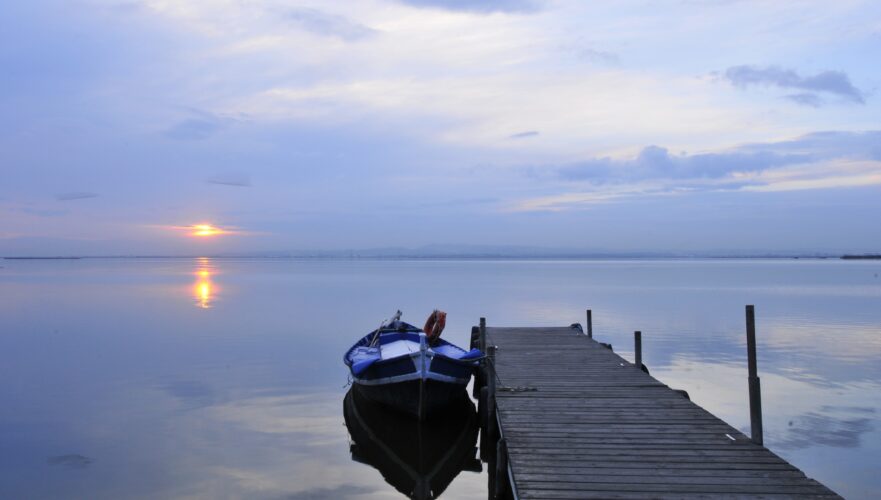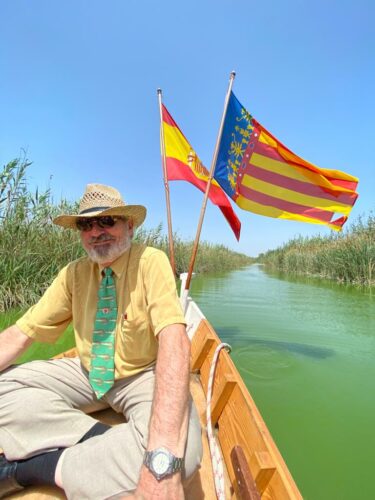The Albufera of Valencia is in a fragile state. While the severe impacts it faced in the late 20th century have been reduced, eliminating the risk of imminent collapse, its future remains uncertain. However, there is hope if we Valencians become aware and take action.
The Albufera of Valencia is a highly complex natural environment that has been significantly altered by human activities over time. Declared a Natural Park in 1986, it holds significant national and international recognition, including designations such as RAMSAR, SPA Area, Natura 2000 Network, BIC of Artisanal Fishing and Vela Latina, GIAHS-FAO, and is currently in the process of becoming a UNESCO Biosphere Reserve. These recognitions should ensure its protection, but unfortunately, they have not been sufficient.
The future of the Albufera depends on the improvement of governance and management of productive and leisure activities, the total elimination of discharges, the recovery of water quality, and the proper management of bottom sediments. and income flows, and all of this depends on the pressure from civil society on administrations to keep their promises and commitments.

The Governing Board of the Albufera Natural Park, an advisory body established by Decree 52/2019, convenes under the presidency of the Department of the Environment. It brings together the three administrations with direct authority over the park: the Valencia City Council, as the owner of the lake; the Generalitat Valenciana, responsible for environmental management and exploitation; and the Júcar Hydrographic Confederation, responsible for water supply. Additionally, it includes representatives from the town councils of the riverside communities and other institutions of Valencian civil society involved in economic activities, as well as residents and visitors who enjoy the Natural Park. This Governing Board should play a more prominent role in decision-making.
For seven centuries, traditional activities in the Albufera of Valencia coexisted harmoniously with the natural environment. It was only the urban and industrial development of the 20th century that caused environmental disaster. Therefore, it is the duty of Valencians to restore the Albufera to its former state. To achieve this, the first step is to complete the pending infrastructure improvement projects, including dredging the Sequiota and Reina ditches, commissioning the storm tanks, separating sewage from rainwater, constructing a new West collector and a new treatment plant or expanding the Pinedo plant, and adapting the ditch network to ensure an adequate supply of winter water. Additionally, it is essential to guarantee the water supply, update regulations (PORN and PRUG), and manage the lake’s sediments and rice straw, among other tasks.
Alongside the increased flows from irrigation modernization, another valuable but underutilized water resource is the reclaimed water from the Pinedo WWTP. Currently employed partially for irrigating rice fields in the lake’s northern area, this resource could further benefit by being utilized during winter for permeating through flooded fields as a natural filtration system.
Currently, the PORN (Natural Resources Management Plan) and PRUG (Basic Rules of Use and Management) are under review for approval. Consensus must be reached to meet the community’s legitimate aspirations for sustainable land development and ensure the creation of modern access roads suitable for the 21st century.
Furthermore, there is a pressing need for an updated assessment of sediment levels in the lake, accompanied by a thorough discussion on its management. Under the current circumstances, restoring water transparency, aquatic vegetation, and populations of microcrustaceans and fish appears to be a formidable challenge.
Managing rice straw presents a significant challenge in the Natural Park, requiring a thorough scientific and economic analysis. Exploring alternative uses such as livestock feed, construction materials, energy production, and bioprotein extraction is crucial. Additionally, organizing its controlled burning in tancats, rather than allowing it to decompose in fields, is essential for pest control and ecosystem health.
Meanwhile, besides urging the authorities to take necessary steps for its restoration, it is crucial to educate young people about the Albufera’s importance and foster their appreciation for it. Furthermore, promoting the Albufera internationally and nationally can enhance environmental, agricultural, fishing, and culinary tourism. Valuing traditional Albufera products such as rice and fish by ensuring fair prices for farmers and fishermen is vital. This supports their livelihoods, stimulates economic growth, creates jobs, and encourages the adoption of environmentally friendly practices.

Professor at Campus Gandia (UPV) and Researcher at the University Institute of Animal Science and Technology. Representative of the UPV on the Governing Board of the Natural Park.
Source: UPV Innovation Newsletter

